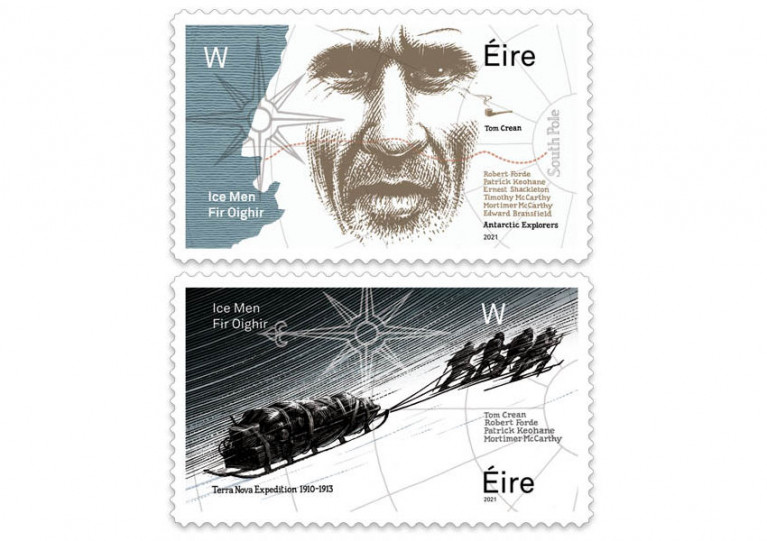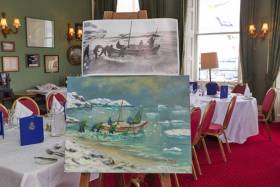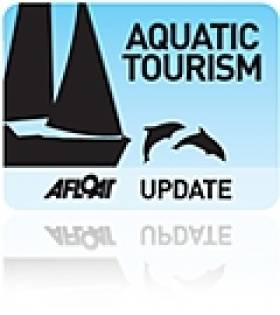Displaying items by tag: Antarctic
Tom Crean Features In New Stamp Set Celebrating Ireland’s Role in Epic Antarctic Expeditions
An Post has issued a new set of four stamps celebrating eight Irish men who played a significant role in the epic Antarctic expeditions of the 1800s and early 1900s.
Irish men were at the heart of the pioneering expeditions to Antarctica. Co Kildare-born Ernest Shackleton and Tom Crean, from Annascaul in Co Kerry, are two of the better known explorers, and have achieved worldwide recognition for their bravery and perseverance.
The other six men featured on the stamps, five from Cork, are less well known but no less important in the contributions they made to Antarctic exploration.
They include Edward Bransfield (from Ballincurra); Patrick Keohane (Courtmacsherry); Robert Forde (Bandon), brothers Mortimer and Tim McCarthy (Kinsale) and Francis Crozier (Banbridge, Co Down).
Leading Irish illustrator David Rooney explained how he wanted the stamps to shine a light on the impact Irish men had on Antarctic exploration.
“Like most people I was aware of the Shackleton and Crean expeditions, it was fascinating to delve into the adventures of a figure like Francis Crozier, who set out in 1839 as commander of HMS Terror on the Ross expedition,” he said.
“Crozier, his ship and all of his crew were subsequently lost, along with Sir John Franklin, on their ill-fated search for the North West Passage in the Arctic just a few years later.”
The four stamps, two for national postage and two for international, and a First Day Cover envelope are available at selected post offices and anpost.com/shop.
#RStGYC - The Royal St George Yacht Club hosted a special presentation of a painting to mark the 100th anniversary of Shackleton's voyage on the James Caird from the South Shetlands to South Georgia.
Painted by Jim Sweeney from Frank Hurley's original photograph, 'Launching the James Caird from the shore of Elephant Island, 24 April 1916' recognises the centenary of the desperate 800-mile search for help across Antarctic waters by a crew that included in its number fellow Irish explorer Tom Crean.
The presentation followed a reception in March at the British Embassy to honour the crew of the Imperial Trans-Antarctic Expedition of 1914-1916 – also known as the Endurance expedition.
Shackleton's Cabin Restored In Connemara As Irish Woman Retraces Adventurer's Route
#Shackleton - As Shackleton's cabin arrives in Connemara for restoration, an intrepid young Irish woman is setting out to retrace the pioneering explorer's Antarctic footsteps.
According to The Irish Times, the 'sea bedroom' where Ernest Shackleton died of a heart attack in 1922 has been relocated to Conservation Letterfrack by its Norwegian owner for an array of restoration works before its transfer to the Athy Heritage-Centre Museum, in the explorer's county of birth, in the new year.
Originally part of the Norwegian steamship Quest, purchased by Shackleton for his final Antarctic voyage, the cabin was removed from the vessel at some point before the ship sank during a seal hunt in 1962, and wound up at a farm in Norway’s Nordland region, where present owner Ulfe Bakke played in it in his childhood.
Bakke has now donated the cabin to join a permanent exhibition in tribute to Shackleton's endeavours, including an original ice sledge and writings from his missions.
As previously reported on Afloat.ie, Shackleton's final resting place on South Georgia Island can be visited virtually via Google Street View.
Meanwhile, Irish Army Lieutenant Sinéad Hunt is entering her last fortnight of training before she embarks on a two-week trek across the Antarctic to mark the centenary of Shackleton's 1915 expedition, as TheJournal.ie reports.
The Dubliner will join New Zealand adventurers Tom McTavish and James Blake on the trip that will take them from the Falklands to South Georgia, following the arduous journey made by Shackleton, Tom Crean and four others after they abandoned the Endurance in pack ice.
To prepare for the challenge, the experienced climber and Alpine skier has been training in the Wicklow Mountains – but the severe storms and blizzards at the end of the world might prove a different prospect.
Shackleton Exhibition's Photo ‘Polar’ Prize
To celebrate the achievements of Shackleton and Hurley's stunning photographic collection, the (MMM) want you to share your photos of spectacular scenery, unusual locations and far-flung destinations. Just add them to the Flickr group to be in a chance of a family concert ticket for the Royal Liverpool Philharmonic's unique combined film and music experience 'Polar'.
The cinematic portrait of the Arctic and Antarctic explores the homeland of the polar bears and humpback whales. The moving imagery will be accompanied by a live orchestral soundtrack performed by the world-renowned orchestra.
For further detailed information about the competition and entry rules logon HERE.
The Endurance: Shackleton's Antarctic Adventure at the Merseyside Maritime Museum is open to the public free of charge until the 27 February 2011. For more info logon HERE
Capital Grant for Dingle Aquarium
The funding will be used to develop a polar penguin exhibition centre. The new facility, which is adjacent to the existing aquarium, will be able to house up to ten penguins in a temperature-controlled environment, to replicate Antarctic conditions. The project is to expected to start shortly and the centre is anticipated to open to the public by Easter 2011.
Since opening in 1996, Oceanworld has attracted 100,000 each year. The company employs a staff of five-full time and 16 part-time staff. As a result of the development, an added three jobs are expected for the new exhibition centre.
The aquarium's website can be found at www.dingle-oceanworld.ie/
































































